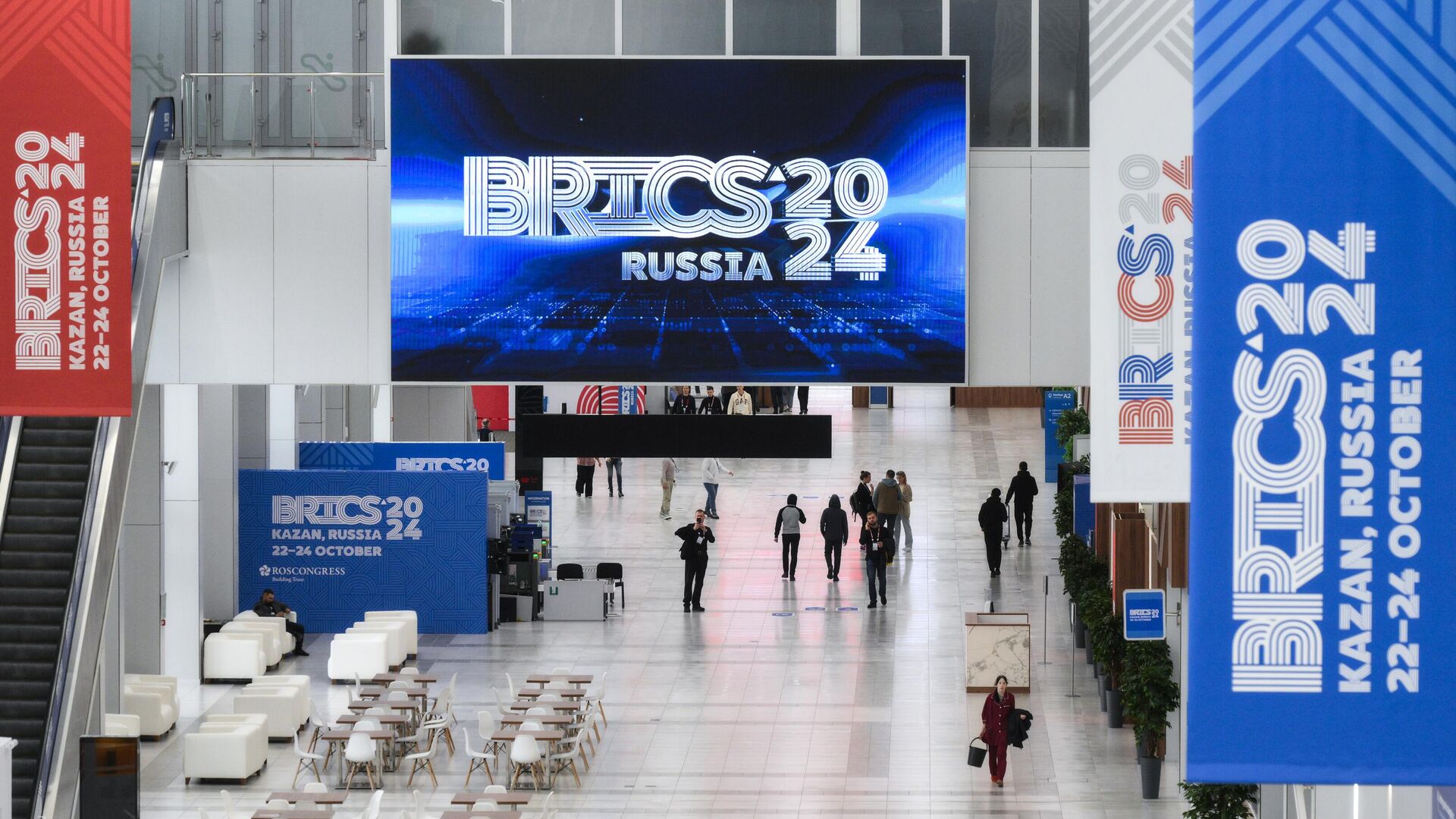https://en.sputniknews.africa/20241023/brics-cooperation-is-alternative-to-west-dominated-world-south-african-expert-says-1068835428.html
BRICS Cooperation is Alternative to West Dominated World, South African Expert Says
BRICS Cooperation is Alternative to West Dominated World, South African Expert Says
Sputnik Africa
BRICS is an intergovernmental organization established in 2006. Russia's 2024 presidency of BRICS began with the joining of new members. Adding to Brazil... 23.10.2024, Sputnik Africa
2024-10-23T16:54+0200
2024-10-23T16:54+0200
2024-10-23T18:49+0200
opinion
brics
brics expansion
brics summit 2024
brics summit
africa insight
development
international monetary fund (imf)
world bank
economy
https://cdn1.img.sputniknews.africa/img/07e8/0a/14/1068785065_0:0:3226:1816_1920x0_80_0_0_18eca8024b669c37a68e27ddab704e07.jpg
More and more countries show an interest in the BRICS bloc because it represents greater cooperation as well as a move away from a unipolar world dominated within global affairs by the hegemony of the US and Western powers, senior research fellow at the Center for African Diplomacy and Leadership at the University of Johannesburg in South Africa, Dr. Oscar van Heerden, told Sputnik Africa on the sidelines of the 16th BRICS Summit in Russia's Kazan.According to van Heerden, BRICS represents an alternative in many ways, including the New Development Bank (NDB), which is a counterweight to the International Monetary Fund and the World Bank. The NDB has made great efforts in terms of infrastructure loans that it has given to countries in Africa, Asia, and Latin America through the Chinese Belt and Road Initiative.Drawing attention to the policy pursued by the US to weaponize the dollar, namely the freezing of dollar assets of other countries, such as Venezuela or Russia, the researcher once again emphasized the need for an alternative for the Global South to protect national interests.Speaking about "a very important historic relationship" between Russia and South Africa, the expert noted that although the two countries at the moment have a fairly small trade balance, they are increasingly identifying new areas of cooperation where the parties are going to find mutual benefit.Dr. Oscar van Heerden concluded that he is sure that the trade balance can increase between Russia and South Africa.
russia
south africa
southern africa
Sputnik Africa
feedback@sputniknews.com
+74956456601
MIA „Rossiya Segodnya“
2024
News
en_EN
Sputnik Africa
feedback@sputniknews.com
+74956456601
MIA „Rossiya Segodnya“
Sputnik Africa
feedback@sputniknews.com
+74956456601
MIA „Rossiya Segodnya“
brics, brics expansion, brics summit 2024, brics summit, africa insight, development, international monetary fund (imf), world bank, economy, trade, russia, russia-africa cooperation, south africa, southern africa
brics, brics expansion, brics summit 2024, brics summit, africa insight, development, international monetary fund (imf), world bank, economy, trade, russia, russia-africa cooperation, south africa, southern africa
BRICS Cooperation is Alternative to West Dominated World, South African Expert Says
16:54 23.10.2024 (Updated: 18:49 23.10.2024) Alla Shukanova
Writer / Editor
BRICS is an intergovernmental organization established in 2006. Russia's 2024 presidency of BRICS began with the joining of new members. Adding to Brazil, Russia, India, China and South Africa, it now includes Egypt, Ethiopia, Iran, the UAE and Saudi Arabia; the latter yet to formalize membership, although participating in BRICS meetings.
More and more countries show an
interest in the BRICS bloc because it represents greater cooperation as well as a move away from a unipolar world dominated within global affairs by the hegemony of the US and Western powers, senior research fellow at the Center for African Diplomacy and Leadership at the University of Johannesburg in South Africa,
Dr. Oscar van Heerden, told
Sputnik Africa on the sidelines of the 16th BRICS Summit in Russia's Kazan
."I think there's a yearning from many countries, particularly in the Global South, to look at alternatives, alternative ways of doing business, alternative ways of moving away from the dollar, and generally just from the hegemony of Western powers. I think that's why more than 30 countries are interested in being part of the BRICS grouping in Kazan," he said.
According to van Heerden, BRICS represents an alternative in many ways, including the New Development Bank (NDB), which is a counterweight to the International Monetary Fund and the World Bank. The NDB has made great efforts in terms of infrastructure loans that it has given to countries in Africa, Asia, and Latin America through the Chinese Belt and Road Initiative.
"So great progress is being made under the umbrella of BRICS. It is moving towards a world that is not more divided but actually is coming together. And I think this is why Western powers see the BRICS grouping as such a threat," the expert noted.
Drawing attention to the policy pursued by the US to weaponize the dollar, namely the freezing of dollar assets of other countries, such as Venezuela or Russia, the researcher once again emphasized the need for an alternative for the Global South to protect national interests.
"And that's why there's this emphasis in saying that we need a new system of promoting our local currencies when we trade with each other and also finding alternative payment systems, because even the Swift system has been weaponized because Russian banks and Russia generally are not allowed to use the international payment system," van Heerden explained.
Speaking about "a very important historic relationship" between Russia and South Africa, the expert noted that although the two countries at the moment have a fairly small trade balance, they are increasingly identifying new areas of cooperation where the parties are going to find mutual benefit.
"Just recently, there's been discoveries of huge gas deposits here in South Africa, and Russia, with Gazprom [a state-owned Russian energy company], is already working with one of our entities here to try to optimize the gas reserves," he gave an example.
Dr. Oscar van Heerden concluded that he is sure that the trade balance can increase between
Russia and South Africa.

